Subtotal: $
Checkout
In the time of the Almoravids, there was a young student at the University of Al-Karaouine in Fez by the name of Brahim Ibn Mansour. Brahim began his studies in his seventeenth year, and continued learning the recitation of the Quran, algebra, astronomy, astrology and rhetoric.
He was a quick, able student and excelled in everything that he put his mind to, especially religion. Known for his honesty and forthrightness, he had many a time spoken reproving words to those students who were less devout than he. But he had more often confessed to his fellow students where his own devotion was lacking, so they did not take it ill when he reproved them, but admired him for his integrity.
The years at school passed and, as he progressed in his studies, his honesty began to turn into self-righteousness, and the self-righteousness into pride. He said to himself, I am accepted by Allah for my great humility and this sets me apart from others.
But to tell the truth, this did not bring Brahim any satisfaction of heart. Deep inside, he knew that his humility was turning into a sham. The wider the disparity between his awareness of this deception and the praise of his peers, the deeper he fell into despondency. Yet he persisted in his high opinion of himself. At length, his despondency led to bitterness, and the bitterness to a quarrelsome spirit that, in turn, caused him to lose many friends. Those who had once sought him out now shunned him. This state of affairs even had its effect on the professors who began to dislike the young man.
Finally, the time of his oral examinations drew near, after which he would be known as Doctor Ibn Mansour. Brahim’s master, the venerable old Doctor Abdul, knew the young man to have an exceptional mind. But he also knew that the condition of his heart could eat up all the goodness, leaving a wake of misery. Therefore, he devised a plan to liberate the head and heart of young Brahim.
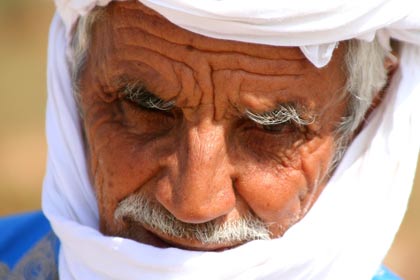
On the day of his oral examination, twenty of the most respected scholars were assembled to hear Brahim’s defense. Since the young man was given to a philosophical bent, he had taken as his theme The Rapprochement of Allah to Mankind and How That May Be Facilitated By Man’s Undivided Devotion to the Religious Exercises of the Heart.
The discussion began and Brahim discoursed on heaven and hell, man and Allah; the twenty scholars asked questions, probed, attacked. At the end there was a conference of the scholars and, at Doctor Abdul’s suggestion, Brahim was given a task to complete before being allowed to wear the white djellaba and beard.
“You have mastered the art of discourse,” said Doctor Abdul, “and are well versed in the philosophical traditions associated with your thesis. Your defense, based on the scriptures and writings has been flawless. You lack one thing, however.”
“Yes, learned Doctor?” said Brahim, surprised that his brilliant defense had not utterly swayed the council.
“We—the other professors and I—feel that your thesis would benefit from the personal influence of living thinkers, worthy men who are still in the world. Therefore, we request that you search out three learned men and ask them this question: What, according to your beliefs, will draw me closer to Allah than any other thing?
“Now, you are commissioned to ask this question of the three deepest thinkers that you can find in each of the three great religions: Islam, Christianity, and Judaism. The deepest thinker is not necessarily the most popular, nor the most well known. We leave that up to your discretion as a scholar and a man of letters.
“Do you have any questions?” Doctor Abdul concluded.
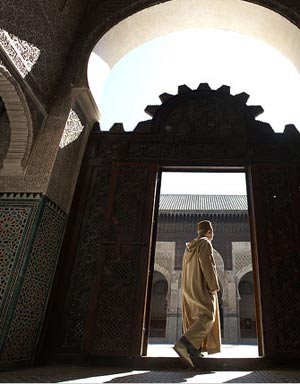 Upon hearing this, Brahim became exceedingly angry. All his hopes of glory were now dashed in one foolish gesture of the council of scholars, many members of which he had angered in the past with his brashness. Fearing that this was an act of spite, his face turned crimson and his chest heaved, but he held his peace, shook his head to indicate that he had no questions, and put his eyes down. He determined in his heart that he would win in spite of this setback. The council disbanded.
Upon hearing this, Brahim became exceedingly angry. All his hopes of glory were now dashed in one foolish gesture of the council of scholars, many members of which he had angered in the past with his brashness. Fearing that this was an act of spite, his face turned crimson and his chest heaved, but he held his peace, shook his head to indicate that he had no questions, and put his eyes down. He determined in his heart that he would win in spite of this setback. The council disbanded.
Without a word, he went to his sparsely furnished cubicle, packed his belongings and left.
Now, Brahim was of a wealthy family and had all the money at his disposal that he might desire, so the task laid upon him by the council was no hardship. Preparing his carriage and bringing along his servant to drive for him, he headed north. By the time he reached the holy city of Moulay Idriss his anger had waned. He knew that of all places in the Mogreb to find a sage and holy man, Moulay Idriss was the likeliest.
It was nearly sundown as the carriage approached the city and the cool November air was beginning to chill Brahim.
“Hurry,” said the young man to his servant. “If we arrive after the sun is down, we will not be allowed to enter the city.”
The servant pressed on, but in spite of his efforts they arrived just after the closing of the gates.
“Now we are in a fine situation,” said Brahim, angrily. “How will we spend the night?”
“There are shepherds and farmers in the countryside,” said the servant. “Perhaps we might ask one of them for lodging for the night.”
“Sleep with farmers and shepherds?” Brahim asked, scornfully. But he let the servant lead on.
Driving about for a half hour or so, they finally came upon a mud dwelling set under the steep hills above the city.
“May we have a night’s lodging?” asked Brahim of the bent old man who came to the door of the hut.
“In the name of Allah, be my guests this night,” said the shepherd – for shepherd he was, as one could tell by the bleating in the front room of the house and the odor of sheep.
So they entered the humble abode. They passed through the stable of the sheep and one gray donkey into a windowless room filled with the smoke of a m’zmar on which was the supper of the old shepherd and his stooped and wrinkled wife.
“Come dine with us,” said the wife.
“Thank you,” said Brahim, adding, “We too have brought victuals which we gladly share with you.” Whereupon, the servant produced a large, round bread and a fat morsel of goat’s cheese.
The four of them fell to upon the food and, over tea, the old man asked why they had come.
“I come seeking a wise man, of whom I must ask a question.”
“And,” asked the man, “of which holy man will you ask the answer?”
“Sidi,” said Brahim. “I seek the imam of Moulay Idriss, who must be one of the holiest men of Islam.”
The old man sipped his tea and then nodded. “Yes, my son,” he said. “I think you are right. And, may I ask what the question is?”
“Surely,” said Brahim. “The question is, ‘What, according to your beliefs, will draw me closest to Allah?’”
“To be sure,” said the old man. “That is a deep and important question. I should like to hear the answer of your learned holy man.”
“And you, Sidi,” said Brahim, assuming a sparring stance. “How would you answer that question?”
The old man put his hand to his beard and stroked it for some minutes, while deep in thought. Presently he said, “My son, I do not have the wisdom of your great and learned men. But anything that draws me closer to my fellow man draws me closer to Allah. I would say, start by humbling yourself before your brothers and this, by bringing you closer to them, will also bring you into the heart of Allah.”
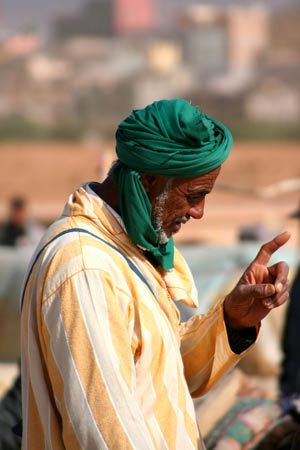 This simple answer left Brahim speechless. His early days in the university passed before his mind—days when he did seek to come close to his fellow students. And he asked himself how such a simple thing could have been lost. It was as though the old man had seen his past and knew where he lacked in humility. His face reddened with embarrassment.
This simple answer left Brahim speechless. His early days in the university passed before his mind—days when he did seek to come close to his fellow students. And he asked himself how such a simple thing could have been lost. It was as though the old man had seen his past and knew where he lacked in humility. His face reddened with embarrassment.
“Thank you, Sidi,” he said when he had recovered his speech. “There is untold wisdom in your words and I am grateful to you.”
That night Brahim slept badly. The next morning he blamed it on the smell of the stable and the bleating of the sheep, but deep in his heart he knew that it was the answer of the old man that troubled him.
After mounting the carriage, the servant swung the horses towards Moulay Idriss, but Brahim restrained him with a word. “No, not to Moulay Idriss. I have already had my answer from a wise and holy man. Turn rather towards Tangiers. Now I must travel to Cairo, to see how a Jew will answer my question.”
By stopping at Tetouan, it took the carriage two days to get to the port city of Tangiers. But a storm had come up and the ships in port were not setting sail until it blew over.
Brahim stood on a pier in the rain and wind, looking out over the straits. In fair weather, as a child, he had once looked across the water and seen the great rock on the far side, the Jubal Atar, rising out of the mist. But today it was not visible in the storm clouds and pelting rain.
Brahim and the servant turned into a small inn located in the Kasbah and prepared to wait out the storm. But no sooner had they settled themselves than the servant took ill and was forced to remain in bed. The illness was such that Brahim began to fear for his life, as it worsened with each passing hour.
Calling a surgeon, he took him to the room of the servant. The old physician took off his djellaba and leaned over the bed to examine the patient. Brahim was surprised to see that the surgeon wore the prayer shawl and skullcap of the Jews.
“Good Doctor,” said Brahim when the two of them were out of the room again and the servant was resting. “I perceive that you are of Jewish origin.”
The physician nodded.
“I seek a Jew,” said the young man.
The eyes of the surgeon narrowed and he looked upon Brahim with suspicion. “And are you in league with those who persecute us beyond the straits?”
“Nay, Good Doctor,” said Brahim with a smile. “Indeed, I have been commissioned by my council of scholars to seek out a Jew of great wisdom and to put a question to him. I have decided to go to Moses Maimonides to find my answer.”
“Sir, you may as well seek Moses the prophet, for all the good it will do you,” said the doctor, “Maimonides has been dead these three or four years. You will get nothing out of him.”
Brahim grimaced. “I am sorry to hear that,” he said. “News often reaches us slowly. Can you suggest another wise man of whom I may ask my question?”
“May I ask,” said the doctor, “what question you will put to him when you find him?”
“Surely,” said Brahim. “I will ask him what, according to the Jewish beliefs, will lead me closest to Allah.”
The old physician snorted. “And do you require the ministrations of a wise man to learn that? Is the answer not locked in the heart of every man and woman?”
Brahim was taken aback by the admonition of the surgeon. “Never did I perceive that, Sidi,” he said. “And...and can you tell me...?”
“Yea,” said the old surgeon. “’Tis no secret. Love the Lord Allah with all your heart and mind and soul. And love your neighbor as yourself. This is found in our sacred Torah.”
The words fell on Brahim's heart like bricks on his head. Speechless, he turned from the physician and went to his room. For the next three days, while his servant languished in bed, Brahim meditated on those words.
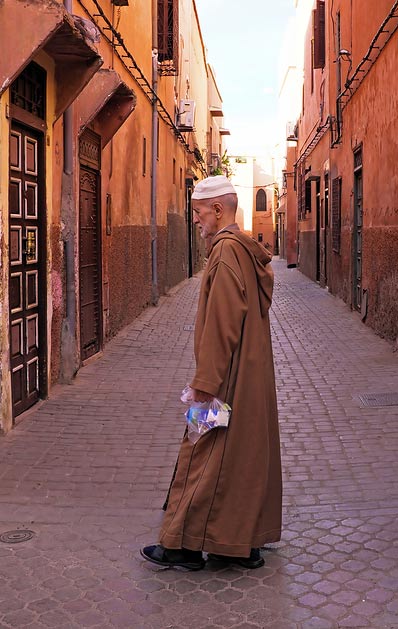 When they were finally able to travel, the servant, who had not been a party to the conversation of Brahim and the doctor, said to Brahim, “Now on to Cairo and the second answer.”
When they were finally able to travel, the servant, who had not been a party to the conversation of Brahim and the doctor, said to Brahim, “Now on to Cairo and the second answer.”
“No, my friend,” said Brahim. “It is now the third answer that I seek. For that, we go to Assisi. I have heard a rumor that there is a holy man of the Christians there who talks to the heavenly bodies and communes with wild creatures. Surely he knows the way to the heart of Allah.”
So, they left the carriage on the docks and took passage on a galleon headed for Rome. On the day they were to set sail from Tangiers, the seas were still wild and tempestuous, but the sailors deemed it safe to sail, so they soon cast off and went out to sea.
The ship was driven to and fro by the winds and waves. Most of the passengers were seasick, including Brahim and the servant. One of the passengers who was not ill, an Italian in the garb of a monk who had boarded at Portus Albus, went from one passenger to another, comforting the sick, bringing bread to help quell the seasickness and ministering to the needs of each one in distress.
When the passenger came to Brahim, who was lying in his bunk, he asked the monk, “Why do you care for all these people as though they were your brothers?”
“Ah, Monsignor,” he replied. “But you all are my brothers and I serve you in place of the Christ who commanded me to treat others as myself.”
“Nay,” Brahim exclaimed, propping himself on his elbow. “I am a true and devout Moslem, a follower of Allah and his prophet, Mohammed. We are not brothers.”
“Is there,” asked the passenger, “more than one Allah?”
A mocking smile came upon Brahim’s lips. “Of course not,” he replied.
“Then the one true Allah is the creator of us all, is He not?”
“Yes,” said Brahim.
“Then,” concluded the passenger, tucking a blanket over Brahim’s shoulder, “we are all brothers of the one true Allah.”
Thinking about this for a moment, Brahim finally said, “Yes, I think you are right. But you said that you are a follower of the Christ. You are a Christian?”
“Yes,” said the passenger.
“I seek a Christian,” said Brahim. “I am on my way to Assisi...”
“For Brother Francis,” the passenger interrupted.
“Surely,” said Brahim. “But how did you know?”
“You see my robe?”
Brahim nodded.
“I myself am one of the band of Brother Francis. I have been on a mission to Spain and am now on my way home. Why do you seek Brother Francis?”
Brahim told the monk of his search and the question that he had to put to three holy men.
Laughing, the monk said, “But you don’t need to go all the way to Italy for the answer to that question. I can tell you what Brother Francis would say.”
“Yes?” said Brahim, eagerly.
“Brother Francis would say to sell all that you have, give the money to the poor, and follow the Christ.”
Brahim was incredulous. “But who can do such a thing? A human being needs sustenance, a livelihood, money, and goods.”
“It is possible,” said the monk, decisively. “We are many in the band that has gathered around Brother Francis, and we all have taken the vow of poverty.”
Brahim was speechless, wondering how one could survive such hardship. As if in answer to the unspoken question, the monk continued, “The Christ provides for us. If we believe that he is powerful enough to do anything, we can trust him for our daily bread. And he is faithful.”
“I see,” said Brahim, unable to articulate any further.
“But,” said the monk, a note of caution in his voice. “It is a dangerous step to take. Once you give up your earthly goods, then you find that all your inner goods—ideas, opinions, plans, hopes—are equally useless in the work of the Christ. They must be given up, as well.”
At that moment a great wave rose on the sea, causing the monk to reel backwards and stumble over a chair. Catching himself, he said, “I must move on now. Others are in need of help. These rough seas are bringing much discomfort.”
And he was off to another cabin.
Brahim thought long and hard about the words of the monk. A week later the ship pulled into a port to replenish provisions. Brahim and his servant stayed behind when the ship left; they were seeking a ship back to Tangiers.
“Our task is completed,” said Brahim to his servant.
Perplexed, the servant humbly followed his master without question.
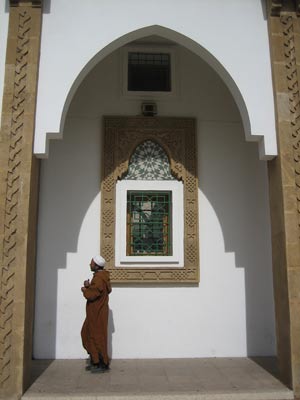 Two weeks later, they arrived in Tangiers. Taking his carriage, Brahim boarded it, along with the servant, and made his way back to Fez and the University of Al-Karaouine.
Two weeks later, they arrived in Tangiers. Taking his carriage, Brahim boarded it, along with the servant, and made his way back to Fez and the University of Al-Karaouine.
“My dear Brahim,” said Doctor Abdul upon seeing his student. “Have you found the answer to the question?”
“Yea, good Doctor,” said Brahim, “and it has changed my life. I can now see that I became a proud, haughty person during my days as a student. The answer to the question has brought me low indeed. I renounce my degree and all of my learning—it does not lead to Allah. Henceforth, I will find my way with the meek and the lowly.”
Doctor Abdul tried to dissuade Brahim from his designs, but the young man would not be deterred. He went home, sold all of his possessions, gave the money to the poor and went about the countryside, dressed in a djellaba and carrying a staff, telling about the love that leads to Allah.

Already a subscriber? Sign in
Try 3 months of unlimited access. Start your FREE TRIAL today. Cancel anytime.






Lawrence
At a cafe a Christian, Jew and Muslim were debating the quality of their religions. A waiter set a water glass before each of them. "See," he said, "three different glasses but all filled from the same jug."
Vijay Raghavan
To the previous comment of Kathyrn....often giving aid especially in money form gets misplaced to a needy & they tend to miss the bigger picture of Christ in leading their life. Paul tells no one to be an idle body and that a man should work and earn his bread. In fact the apostle himself worked so as not to be a burden on others 2Thesolannians 3:7.
Kathryn Broughton
I read this story just a few moments after I had written to one of the people I mentor online with a Christian mentoring site. She is a young destitute uni student and has not eaten for a few days. I have helped her financially in the past (sending money because she lives on another continent). Last time, in January, I sent a fairly large sum (for me and probably much more than she was expecting) and told her that I did not feel I could help her more in that way. She is obviously hoping that I will send her more in her need but I advised her this morning to go out from her room and try to find some help because she is young and able to offer to do something for somebody in exchange for food. Unfortunately, she took it the wrong way and was very offended. I was sad but as I read this story I realised that God is teaching and correcting me too. Not necessarily that I must try and send her money but that I must learn to be more humble and loving in the way I serve Him and others. Thank you for this great site.